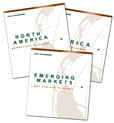CSM: Rapidly Rising Prices and Demand for Oil will Fuel the Drive Toward Better Vehicle Fuel Efficiency and Alternative Fuels
 |
NORTHVILLE, Mich., Nov. 13, 2007 -- Skyrocketing oil prices spurred by rapidly rising energy demand in developing countries are pushing automakers to step up advances in fuel efficiency, according to an analysis by automotive market forecasting firm CSM Worldwide. During its first annual Executive Series Briefing for automotive supplier executives, CSM showed that while automakers are actively pursuing advanced technologies such as engine downsizing, turbocharging, direct injection, diesel, hybrids and advanced transmissions, tremendous opportunities remain for improving vehicle fuel efficiency.
"It's astounding when you realize that only 15 percent of the energy from the fuel in a vehicle's tank actually gets used to move it down the road," said CSM Powertrain Forecasts vice president Eric Fedewa. "Emerging technologies have the potential to recover much of the 85 percent lost to engine and drivetrain inefficiencies, idling and accessories. We expect to see increases in engine efficiency of 25 percent and transmission efficiency of six to 12 percent. Reductions in weight, mechanical friction and rolling resistance, along with improved aerodynamic and electrical systems, can add substantial additional efficiency. And one of the biggest benefits of better fuel efficiency is reduced CO2 output."
CSM research shows that the major OEM focus is currently on variable valve timing, clean diesel and six-speed automatic transmissions. The next wave of development is expected to include gasoline direct injection and dual-clutch transmissions. But despite ongoing improvements in individual vehicle efficiency coupled with the trend toward smaller vehicles, global vehicle CO2 output will continue to increase because the global vehicle fleet is growing rapidly, primarily due to exploding demand in developing countries.
"Even though total vehicle CO2 output will continue to rise, it's important to keep the vehicle part of the CO2 equation in context," Fedewa added. "CO2 from road vehicles makes up only about 14 percent of total global CO2 emissions. Power generation plants and industrial processes together account for 50 percent of the total, and global energy demand continues to grow. CO2 output in China will increase by 3.4 percent per year through 2030 and will exceed U.S. emissions in the next three to eight years."
As the global demand for oil continues to grow, securing sufficient oil supplies becomes critically important to developed countries. This will drive further research into electric drive, electrical storage technology and biofuels. CSM foresees the production cost of ethanol from cellulosic biomass to fall from the 2005 cost of $2.26 per gallon to $1.07 in 2012 and 59 cents by 2020, thanks to improving production efficiencies and lower raw-material costs.
CSM Worldwide provides trusted automotive market forecasting services and strategic advisory solutions to the world's top automotive manufacturers, suppliers and financial organizations. CSM Worldwide covers the global automotive environment from Detroit, Grand Rapids, Sao Paulo, London, Paris, Frankfurt, Budapest, Delhi, Bangkok, Shanghai and Tokyo.


